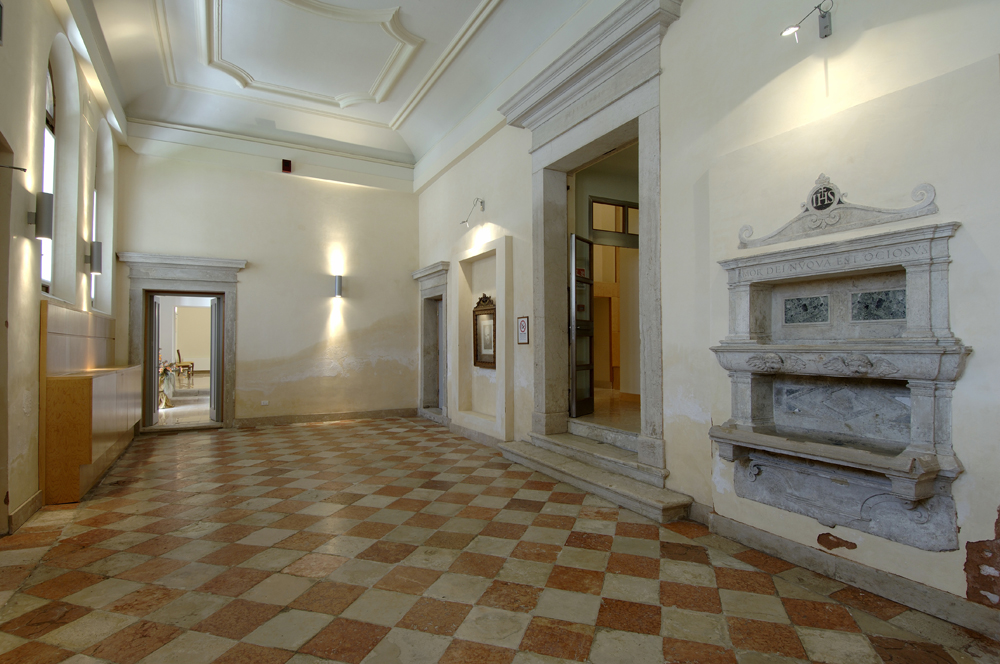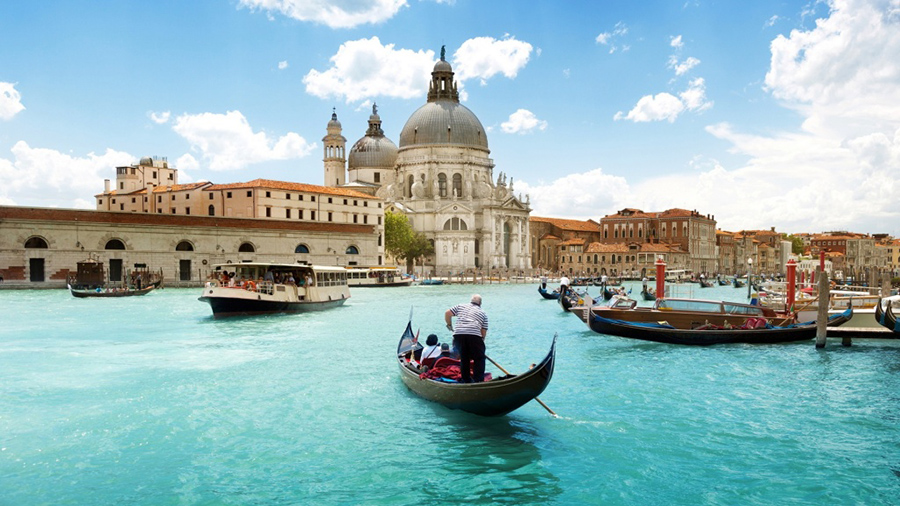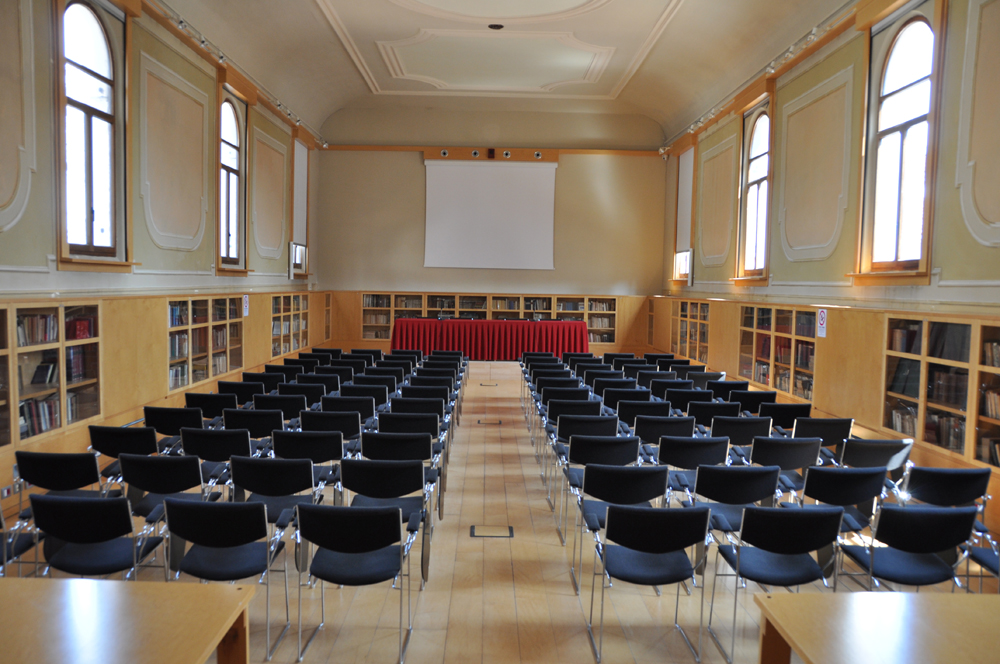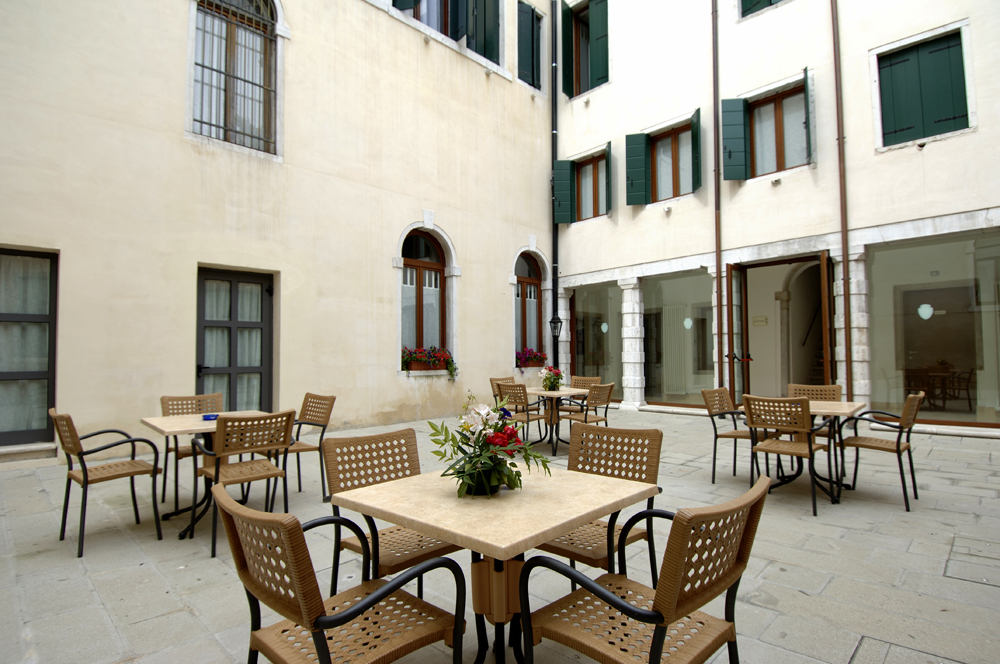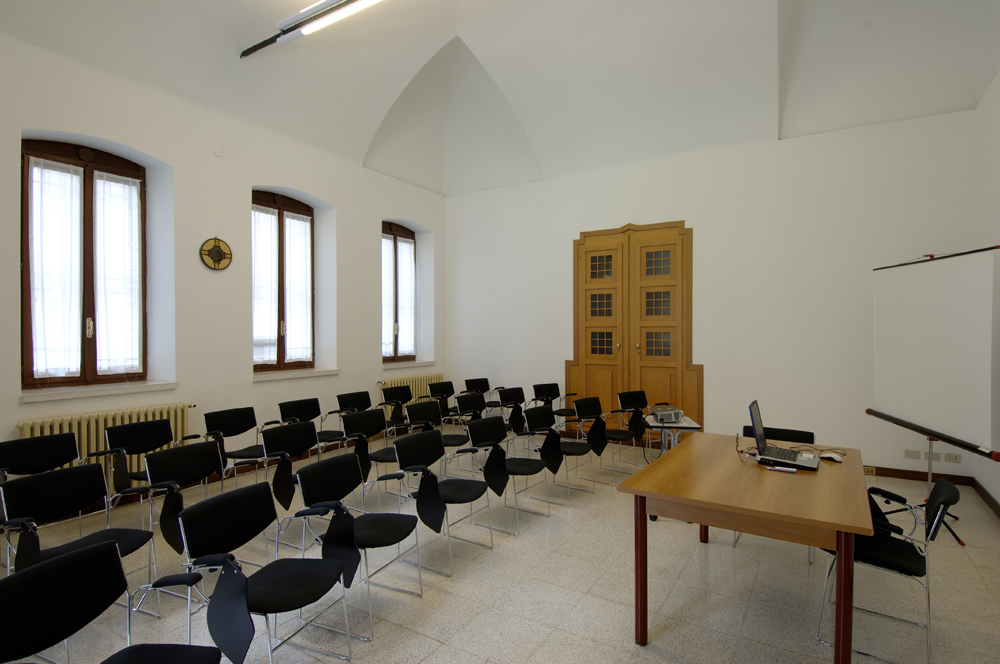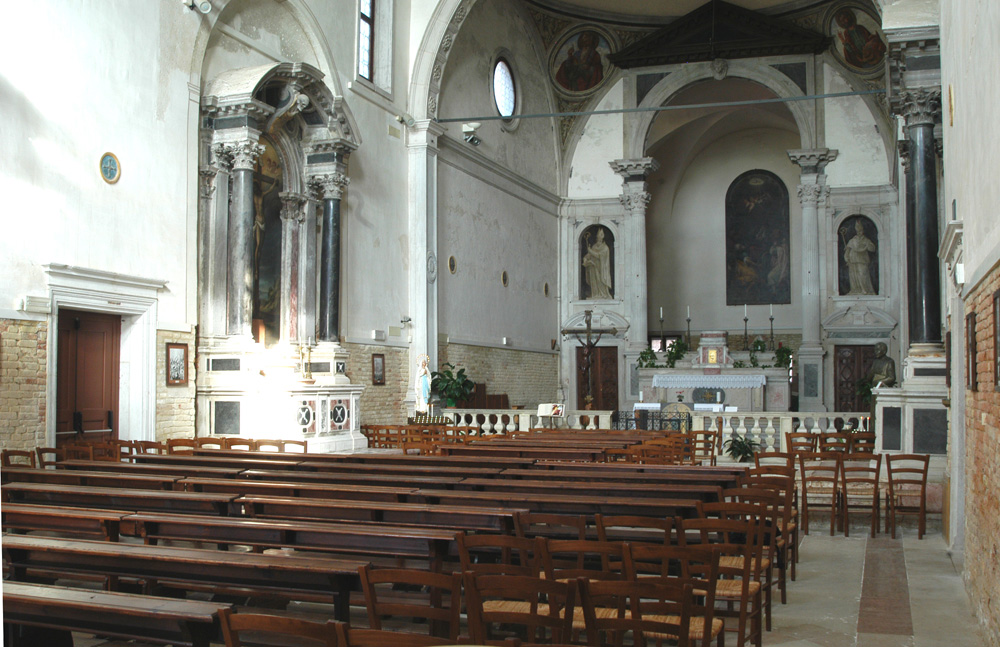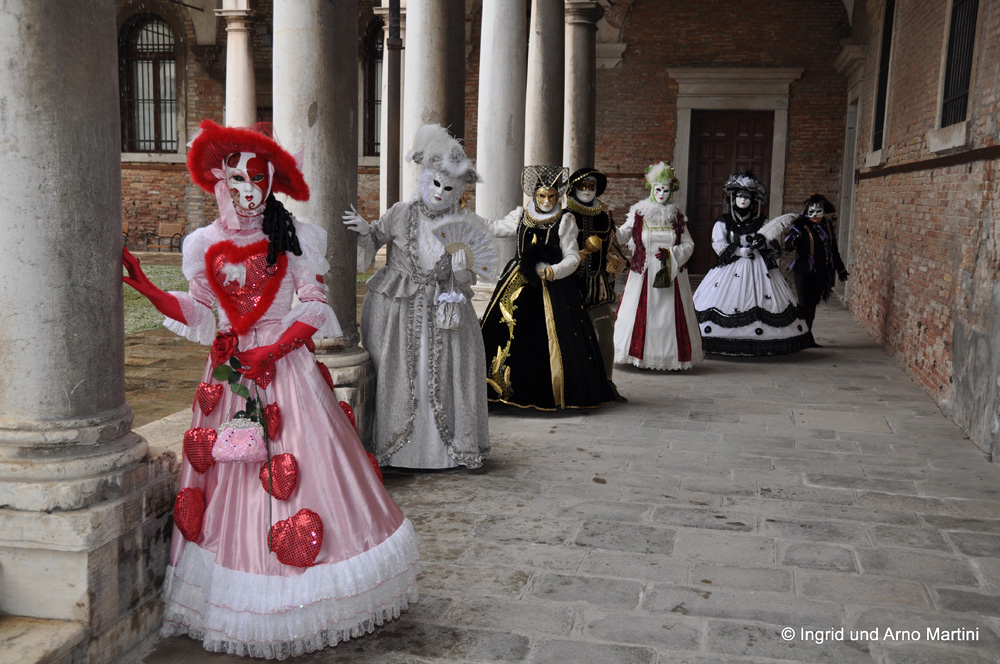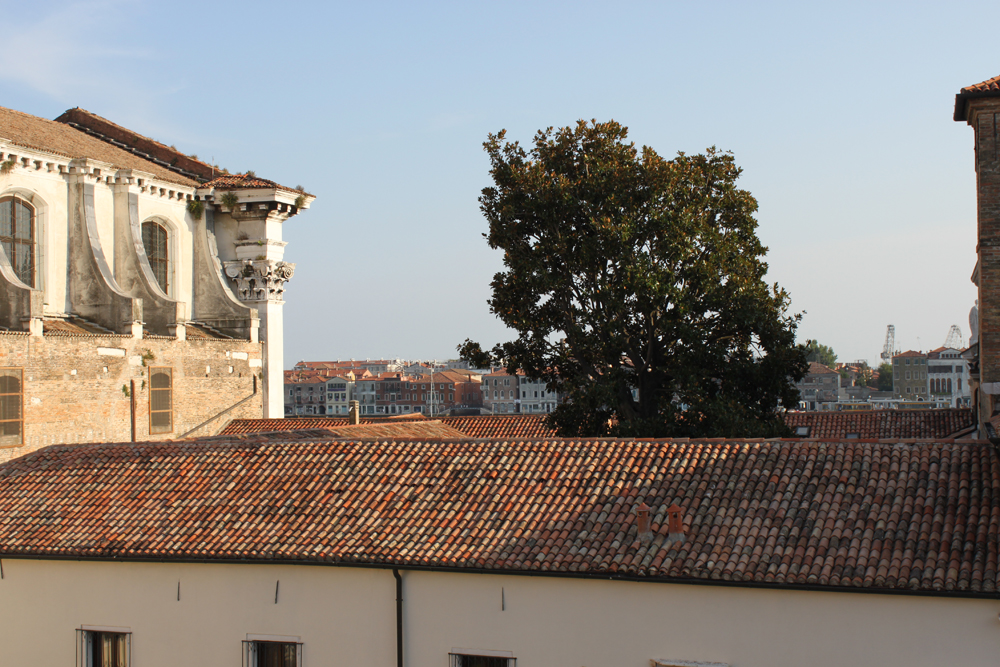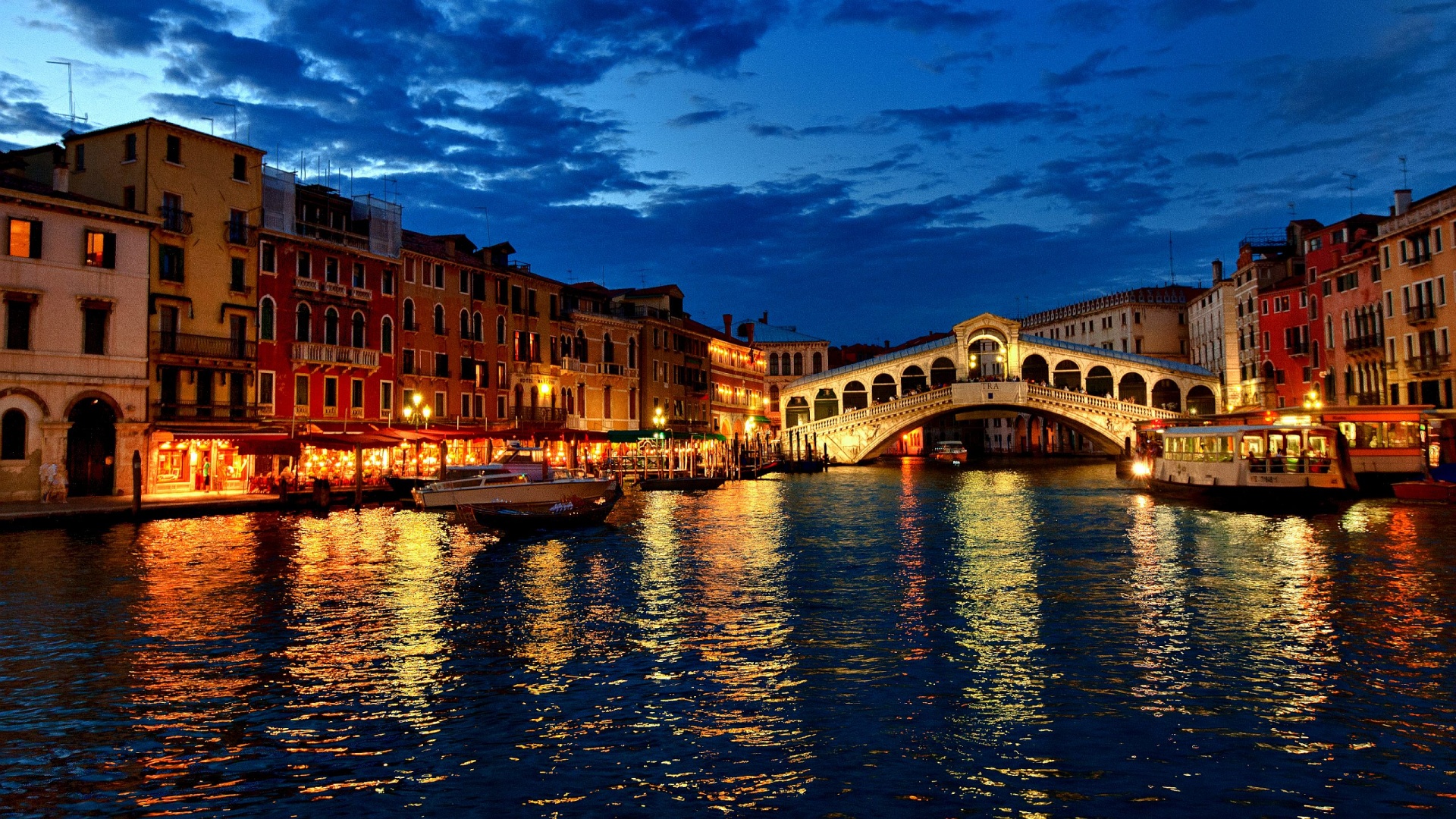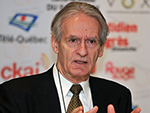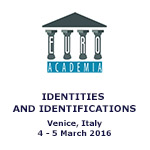Cultural Centre Don Orione Artigianelli
Conference Room: Vivaldi
Dorsoduro 909/a
30123 Venezia – ItaliaConference Program
- March 4, 2016
- 08:30 - 09:00Registration (Registration Desk – Conference Room Vivaldi)
- 09:00 - 09:30Welcome and Opening Remarks
- 09:30 - 10:30Keynote Speaker: Gérard Bouchard (Université du Québec à Chicoutimi) - Europe in Search of Europeans: The Road of Identity and Myths
- 10:30 - 11:00Coffee Break and Snacks
- 11:00 - 13:00Panel 1: History Reading, Identity Making and Narratives of Cultural Belonging: Collective Identities, Ethnicity and Politics of Representation through Difference
- 13:00 - 14:30Italian Specialties Lunch - Restaurant
- 14:30 - 16:30Panel 2: Politics and Identity: Political Factors Impacting Identitarian Claims
- 16:30 - 17:00Coffee Break and Snacks
- 17:00 - 19:30Panel 3: Identities and the Cities: Transformation, Transition and Change in Urban Image Construction
- 19:30 - 20:00Welcome Drink Out in Venice
- 20:00 - 21:30Optional Social Dinner in Venice
- March 5, 2016
- 08:30 - 10:30Panel 4: Intellectual History Readings: Society, Memory, Politics and Identity Making Practices
- 10:30 - 11:00Coffee Break and Snacks
- 11:00 - 13:00Panel 5: Art, History and Performing Identities: From the Performativity of the Body to Performing Collectivities
- 13:00 - 14:30Italian Specialties Lunch - Restaurant
- 14:30 - 16:30Panel 6: (En)Gendering Identities: Gendered Identities as Social Constructs and Narrations of Lived Experiences
- 16:30 - 17:00Coffee Break and Snacks
- 17:00 - 19:00Panel 7: Identity and Visual Representations: Border Objects, Painting, Photography and Film as Identitarian Signifiers
- 19:00 - 19:30Concluding Remarks and Discussions
- 19:30 - 21:00Optional Social Dinner in Venice
- March 4, 2016
Identities and Identifications: Politicized Uses of Collective Identities (Fourth Edition)
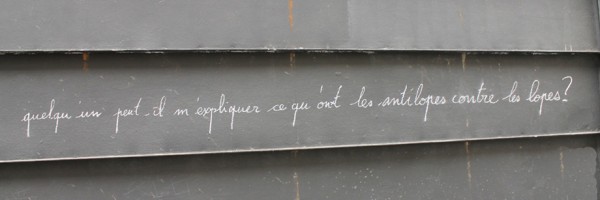
- Conference Description
- Participant’s Profile
- Registration and Fee
- Social Activities and Publication
- Important Dates
- Venue and Directions
- Conference Program
- Keynote Presentation
- Panel 1
- Panel 2
- Panel 3
- Panel 4
- Panel 5
- Panel 6
- Panel 7
The Fourth Euroacademia International Conference
Identities and Identifications
Politicized Uses of Collective Identities
4 – 5 March 2016
Cultural Centre – Don Orione Artigianelli
Venice, Italy
Keynote Speaker: Gérard Bouchard (Université du Québec à Chicoutimi, Canada)
Conference Description
Identity is one of the crown jewelries in the kingdom of ‘contested concepts’. The idea of identity is conceived to provide some unity and recognition while it also exists by separation and differentiation. Few concepts were used as much as identity for contradictory purposes. From the fragile individual identities as self-solidifying frameworks to layered in-group identifications in families, orders, organizations, religions, ethnic groups, regions, nation-states, supra-national entities or any other social entities, the idea of identity always shows up in the core of debates and makes everything either too dangerously simple or too complicated. Constructivist and de-constructivist strategies have led to the same result: the eternal return of the topic. Some say we should drop the concept, some say we should keep it and refine it, some say we should look at it in a dynamic fashion while some say it’s the reason for resistance to change.
If identities are socially constructed and not genuine formations, they still hold some responsibility for inclusion/exclusion – self/other nexuses. Looking at identities in a research oriented manner provides explanatory tools for a wide variety of events and social dynamics. Identities reflect the complex nature of human societies and generate reasonable comprehension for processes that cannot be explained by tracing pure rational driven pursuit of interests. The feelings of attachment, belonging, recognition, the processes of values’ formation and norms integration, the logics of appropriateness generated in social organizations are all factors relying on a certain type of identity or identification. Multiple identifications overlap, interact, include or exclude, conflict or enhance cooperation. Identities create boundaries and borders; define the in-group and the out-group, the similar and the excluded, the friend and the threatening, the insider and the ‘other’.
Beyond their dynamic fuzzy nature that escapes exhaustive explanations, identities are effective instruments of politicization of social life. The construction of social forms of organization and of specific social practices together with their imaginary significations requires all the time an essentialist or non-essentialist legitimating act of belonging; a social glue that extracts its cohesive function from the identification of the in-group and the power of naming the other. Identities are political. Multicultural slogans populate extensively the twenty-first century yet the distance between the ideal and the real multiculturalism persists while the virtues of inclusion coexist with the adversity of exclusion. Dealing with the identities means to integrate contestation into contestation until potentially a n degree of contestation. Due to the confusion between identities and identifications some scholars demanded that the concept of identity shall be abandoned. Identitarian issues turned out to be efficient tools for politicization of a ‘constraining dissensus’ while universalizing terms included in the making of the identities usually tend or intend to obscure the localized origins of any identitarian project. Identities are often conceptually used as rather intentional concepts: they don’t say anything about their sphere but rather defining the sphere makes explicit the aim of their usage. It is not ‘identity of’ but ‘identity to’.
The Fourth Euroacademia International Conference ‘Identities and Identifications: Politicized Uses of Collective Identities’ aims to scrutinize the state of the art in collective identities research, to bring once more into debate the processes of identity making, identity building in both constructivist or de-constructivist dimensions. It is the aim of the Euroacademia conference to open the floor for dynamic multi-dimensional and inter-disciplinary understandings of identities in their historic formation or in the way they shape the present and future of organizations or communities.
Euroacademia aims to bring together a wide network of academics, researchers, practitioners and activists that are willing to share and open to debate their research on identity related topics. Disciplinary, trans and inter-disciplinary approaches, methodological assessments and recommendations, single case studies or cross-sectional analyses, reflective essays, experience sharing or works addressing new puzzles are all welcomed.
Participant’s Profile
The conference is addressed to academics, researchers and professionals with a particular interest related to the topic of collective identities from all parts of the world. Senior and junior researchers are equally welcomed. As the nature of the conference is intended to be multidisciplinary in nature, different academic backgrounds are welcomed.
Post-graduate students, doctoral candidates and young researchers are welcomed to submit an abstract. Representatives of INGOs, NGOs, Think Tanks and activists willing to present their work or projects with impact on or influenced by specific understandings of identities are welcomed as well to submit abstracts of their contributions.
Abstracts will be reviewed and the participants are selected based on the proven quality of the abstract. The submitted paper for the conference proceedings is expected to be in accordance with the lines provided in the submitted abstract.
Registration and Fee
The Registration Process is Now Closed
The Participation Fee Includes:
- the registration fee
- participant’s package with all the materials for the conference
- eligibility for publishing of the presentation in the conference volume
- a copy of the electronic volume
- access to Euroacademia discussion group and newsletters
- 2 daily coffee brakes with snacks and refreshing drinks during the conference
- a welcome drink and snack on 4th of March 2016
- a 3 course Venetian specialties lunch on 4th of March 2016
- a 3 course typical Venetian specialties lunch on 5th of March 2016
- certificate of attendance
- access to optional social program
Unfortunately, Euroacademia has no available funds for covering transport and accommodation to/in Venice. Participants are responsible for securing funding to cover transportation and accommodation costs during the whole period of the conference. Official invitation letters can be sent by Euroacademia to the financing institution to confirm the selection and participation in the conference upon request. Discounted rates for booking accommodation at the conference venue are available for the selected presenters.
Social Activities and Publication
A specific spot in the conference program will be dedicated to social networking and therefore all the participants interested in setting or developing further cooperation agendas and prospects with other participants will have time to present and/or promote their project and express calls for cooperation.
A specific setting (Social Corner) for promotional materials connected with the topic of the conference will be reserved for the use of the participants. Books authored or edited by the participants can be exhibited and promoted during the whole period of the conference and can also be presented within the conference package based on prior arrangements.
An optional dinner and as social event will be organized for the first and second evening of the conference in a typical Venetian cuisine restaurant as optional program for the willing participants. The social dinner will be held based on participant’s prior confirmation and it costs around 30 Euro to be covered by the participants individually.
Publication:
Selected papers will be published in an electronic volume with ISBN after the confirmation of the authors and a double peer-review process based on an agreed publication schedule. All the papers selected for publication should be original and must have not been priory published elsewhere. All participants to the conference will receive a copy of the volume.
| Important Dates | |
|---|---|
| 15th of December 2015 | Deadline for Submitting Panel Proposals |
| 15th of January 2016 | Deadline for Paper Proposals: 300 words abstracts and details of affiliation |
| 16th of January 2016 | Latest notification of acceptance |
| 20th of January 2016 | Sending the Registration Form |
| 25th of January 2016 | Payment of the conference fee |
| 15th of February 2016 | Sending the draft paper to be uploaded on the web site of the conference |
| 20th of February 2016 | Publication of the conference program and uploading the draft papers on the website |
| 4th of March 2016 | The conference commences at 9.00 am |
Venue and Directions
The conference will take place in the XVth century Cultural Centre Don Orione Artigianelli, centrally located in the heart of Venice, located in an enchanting part of the city, just between “Gallerie dell’ Accademia” and the quayside Zattere, next to Gesuati Church and the Church Santa Maria della Visitazione, a 10-minutes walk from St Mark’s Square. Dorsoduro 909/a – 30123 Venezia – Italia Cultural Centre Don Orione Artigianelli was established in 1423 as a Jesuits’ monastery, lay brothers who dedicate themselves to look after the sick. At the end of the fifteenth century they also began the construction of the church of St. Mary of the Visitation. In 1669, the convent and church were purchased by the Dominican Fathers, who erected the new church of Santa Maria del Rosario and began the extension of the monastery under the direction of the architect Giorgio Massari. In 1810 Napoleon issued a decree for the dissolution of the religious order and confiscated the goods. From 1815 to 1850 the building was managed by the Municipality of Venice as an orphanage which, from 1851 to 1866, was entrusted to the Somaschi Fathers from San Girolamo but their congregation retired in 1866. The orphanage was purchased in 1867 by the Congregation of Charity, a lay organization with an educational purpose which decided to sell the property in 1923. On the 4th of August 1923 Don Orione purchased the entire property, thus continuing its work of helping orphans and children with hard family conditions. For decades, the boarding school with its professional schools and laboratories of mechanics, carpentry and typography was concerned with the education of hundreds of young people whose skills, once they graduated, were very appreciated in the world of business, hence the name “Artigianelli Institute”. In the early Eighties’, the mission of the centre changed from child care to support to young University students, in order to face different tendencies and several requests to provide accommodations to students who, every day came from various, even far, places to attend the numerous University departments of the city.
Cultural Centre Don Orione Artigianelli
tel. 0039 041 5224077
fax 0039 041 5286214
[email protected]

HERE
Conference participants are responsible for arranging the accommodation and travel to Venice.
Conference Program
The Conference Agenda is available in the right sidebar.
The full conference program with abstracts and available draft papers is available below by clicking on the respective panel number tab.
Keynote Presentation
Keynote Speaker:
Gérard Bouchard (Université du Québec à Chicoutimi)
Europe in Search of Europeans: The Road of Identity and Myths
Gérard Bouchard is a Canadian intellectual and scholar. Historian and sociologist, Gérard Bouchard is Professor at the Humanities Department of Université du Québec à Chicoutimi and the holder of the Canadian Research Chair on Collective Imaginaries. He is a prolific contributor to the study of identities, social myths, inter-cultural societies and ethno-cultural diversity with a substantive record of publications and academic presentations all over the world. He also authored fictional writing publishing until now 3 novels.
Gérard Bouchard Gérard Bouchard was appointed to the French Legion of Honor in October 2002 and became a member of the Académie des Lettres du Québec in November 2003. He has received numerous awards and distinctions, including the 2000 Literary Award of the Governor General of Canada for his book, Genèse des nations et cultures du Nouveau Monde: Essai d’histoire comparée, the 2001 Gérard-Parizeau Prize for Québec History, and Honoris Causa doctorates from McGill, New Brunswick, Guelph University, Laval University and Sherbrooke University. His novel, Uashat, was chosen as one of the ten finalists for the Readers Prize (Montréal Book Fair, November 2009). His book, The Making of the Nations and Cultures of the New World, was selected as one of the five best Québec essays of the last decade (2000-2009). He was also the winner of the best lecture for The Next Big Question contest, organized by the Canadian Institute for Advanced Research (CIFAR) in Montreal (May 2010).
In 2007, Gérard Bouchard was named, together with Charles Taylor, as Co-President of Quebec’s Commission de consultation sur les pratiques d’accommodement reliées aux différences culturelles (CCPARDC) and together with Charles Taylor wrote the landmark 2008 Bouchard-Taylor report about reasonable accommodation of Quebec’s ethnic and religious minorities.
In 2008-2009, Gérard Bouchard held the William Lyon Mackenzie King Research Chair of Canadian Studies (Weatherhead Center for International Affairs) at Harvard University. He was also visiting professor at Harvard University (Sociology) in 2008-2009.
Europe in Search of Europeans: The Road of Identity and Myths
- Europe in Search of Europeans: The Road of Identity and MythsI contend that a particularly unfortunate cultural choice made by the EU was to distrust and sidestep the nations (as configurations of culture, not to be confused with the states), and to opt for a top-down process of governance. In order to break this pattern, I suggest that the EU will have to find a way to mend fences with the nations in order to i) put an end to a long-standing detrimental tension, ii) harness rather than stifle the nations’ still substantial symbolic resources and energy, and iii) secure a platform to build new European myths.Gérard Bouchard, Université du Québec à Chicoutimi, Canada
History Reading, Identity Making and Narratives of Cultural Belonging: Collective Identities, Ethnicity and Politics of Representation through Difference
- Progenies of Priam:The Trojan War and the Propaganda of Identity and BelongingTold through visual culture and artifacts scattered throughout the world, this paper explores the quest for legitimacy and belonging in nation-building and propaganda as related to the Trojan War and its participants, and how the myth-historical event continues to resonate with a modern artists and leaders.Kristin M. Barry, Ball State University, USA
- Transcending Borders: Sheila Mysorekar’s Reflections on Transnational IdentitiesThe Indian-German essayist, poet, and journalist Sheila Mysorekar is a strong voice in debates about racism, multiculturalism and transnational identities in Germany. She consistently addresses human rights and minority concerns in her writing and uses satire as an effective strategy to underscore her arguments. For her identities are political.Jennifer E. Michaels, Grinnell College, USA
- Defamiliarizing the Familiar and Moving the Immovable: Exile, Return, and the Journey in Ḥussein Barghoutī’s The Blue Light, and I Will Be Among the Almond TreesThis paper aims to show how the modern Palestinian author, Ḥussein Barghoutī, provides new definitions of the notions of exile, return, and journey that go beyond their traditional definitions in the Palestinian literary context.Haneen Omari, Institute for Area Studies, Leiden University, The Netherlands
- Constructing Hindu Identity in Textbook Narratives: The Concept of DecontextualizationThis paper takes as its point of departure the main priority of the BJP within the field of education: the decision to publish new history textbooks. I examine these textbooks as integral to BJP’s identity political agenda, and ask in what ways they defined and invoked Hindu identity.Lars Tore Flåten, University of Oslo, Norway
- Contested Identities among Japanese-Bolivians Pre-War and Post-War DescendantsHow is Bolivian Nikkei identity defined by whom, how and why? What are the discourses of inclusion and exclusion, where are intersections with class identification and what does that mean for the creation of a Bolivian Nikkei community?Yvonne Siemann, University of Lucerne, Switzerland
Politics and Identity: Political Factors Impacting Identitarian Claims
- National Identity and Public Goods ProvisionThe paper proposes theories examining the interplay between national identity and public goods provision, then shows empirically that the most nationalistic countries excel" in poor provision of public goods. It challenges the conventional wisdom on the role of national identity, suggesting that most of the cases it is used as a tool to divert the attention of citizens from most pressing issues such as provision of elementary public goods.Ani Harutyunyan, LICOS - Centre for Institutions and Economic Performance at KU Leuven, Belgium
- The Role of Secession in the Theory of Anarchy: Deconstruction of Collective IdentitiesIn this paper I will analyze the concept of secession in the contemporary theory of political anarchy, as suggested by Murray Rothbard and his followers, as a concept of deconstruction of wider collective identities. Secessionist movements have a fundamental support from the anarchistic theory, because any case and situation of secession leads to reduction of the state sovereignty as a consequence.Aleksandar Savanović, Faculty of Political Science, University of Banja Luka, Bosnia and Herzegovina
- The ‘Indispensable Nation’ in a Post-American World: American Exceptionalism and President Obama’s Post-American Vision of HegemonyThis paper explores the discursive performance and political significance of American exceptionalism under the Obama presidency, and its consequences for US foreign and security policy. It examines how American exceptionalism represents a key identity construct that is intertextually constituted and reconstituted between the language of political decision-making, the intellectual expertise in America’s strategic community of think tanks and policy experts, and reflections in popular media.Georg Löfflmann, Department of Politics and International Studies, University of Warwick, UK
- How to Be or Not to Be an Iraqi Kurd? Processes of Identity Consolidation beyond National and Ethnic Rhetoric in the Autonomous Region of Kurdistan in Northern IraqThis paper aims at presenting the ways both main actors (regional and federal government in Iraq) have nurtured various discourses on identity and on the different types of identities for political purposes and the enforcement of the collective’s own interests.Silvia-Lucretia Nicola, University of Potsdam, Germany
- Turkish National Identity and the EU under the AKP: A Discursive ApproachIn a broadly constructivist context, the article uses Foreign Policy Discourse Analysis, a form of analysis based on Foucault's conception of discourse, in order to examine the discourse of the ruling AKP (Adalet ve Kalkınma Partisi - Justice and Home Affairs Party) on the Turkish accession process to the EU in the context of broader discourses on state and nation and on discourses of self and other vis a vis Europe.Catherine MacMillan, Yeditepe University, Istanbul, Turkey
Identities and the Cities: Transformation, Transition and Change in Urban Image Construction
- Embattled Towns – Images of the Balkans in Descriptions and Travelogues of the 17th and Beginning 18th CenturiesTowns in the Balkans were located at the travel routes from Vienna to Constantinople, and were therefore addressed in travelogues as well as in reports on topographical and geographical, historical and political issues.Elke Katharina Wittich, Hochschule Fresenius, Hamburg, Germany
- Nova Oeiras Neighbourhood Unit to UNESCO Heritage List: A Strong Case of Civic Identity and InterventionBRNO´s universal value, as a landscape, architectural and urban paramount, must be emphasized – at the same time, explaining as this site is sustained in an overall manner by the support and adhesion of its living community, showing a strong sense of local participation and initiative.José Manuel Fernandes, University of Lisbon, Portugal
- Californian Exopolis: Hector Tobar’s and Tim Z. Hernandez’s Literary InterventionsIn my presentation I focus on the literary representations of California´s underrepresented communities and their habitats. I interpret these places as zones of disruption of the historical and cultural discourses.Katarzyna Nowak-McNeice, Universidad Carlos III de Madrid, Spain
- A Strategic Modernity on the Shores of the Bosphorus: Istanbul Museum of Modern ArtIstanbul Modern is a win-win collaboration between the private promoters of the museum and the political actors in the context of identity and image making, liberalization, urban planning, and the once-desired Turkish membership into the EU.Lora Sariaslan, University of Amsterdam, The Netherlands
- Does Growing Nationalism Trigger Transnational Cooperation Among Cosmopolitans? The Case of the German-Polish Border Towns Frankfurt (Oder) & SłubiceThis paper will elaborate at the micro level by assessing transborder conflict dynamics between cosmopolitan and nationalist local deputies from the German-Polish border towns Frankfurt (Oder) and Słubice.Stefan Kunath, Viadrina European University Frankfurt
- Maintaining a Japanese Cultural Identity Abroad: ‘Old Japan’ at the Japanese Department Store ‘Shirokiya’ in HonoluluThe existence of the department store ‘Shirokiya’ finds its reasons. Especially for the elderly Japanese Americans, the children and grandchildren of those immigrants, the department store constitutes a crucial role for dealing with their Japanese identity throughout various spheres.Jutta Teuwsen, Heinrich Heine University Düsseldorf, Germany
Intellectual History Readings: Society, Memory, Politics and Identity Making Practices
- Intellectuals, Ethnicity, and Nationalism: Evidence from CataloniaHow do intellectuals think about nationalism when that becomes a seriously divisive issue? Do they all converge towards the same view, or is there a polarization of expert opinion? If, as it seems to be the case, there is polarization, what factors explain each individual intellectual’s choice? Our results show that, far from seeking to appease passions, intellectuals are more polarized than the wider public. More worryingly, we find that intellectuals are, like the general public, largely motivated by ethnic considerations.Yannis Karagiannis, Institut Barcelona d'Estudis Internacionals, Spain
- Forward an Anthropological Perspective of Alzheimer’s Disease: The Symbolic Meanings of Memory Loss in a Commemoration SocietyI would like to demonstrate that the commemoration practice in not really based on the historical objectivity of the past event but rather on a political performance promoting the mythisation of it, in order to reinforce the social cohesion around a dominant system of values at the bottom of collective identity.Gloria Frisone, École Des Hautes Études en Sciences Sociales (EHESS), Paris
- ’Wounded Attachments’ and Memory Making in Eastern EuropeMuch of the official narratives proposed in these cases employ an 'emphatic unsettlement' that rejects both straightforward linear narratives of recovery and integral systems of truth and reconciliation. The analysis tracks how such instances of public memory engage with politicized identities. How do the double occupation paradigm and anti-communism then work with different intensities of nationalism?Dana Dolghin, University of Amsterdam, The Netherlands
- Romanian Dacianism and the Production of a “Vernacular Modernity” in the Context of the Europeanization ProcessIt is exactly within the effort of integration in the European Union, in the context of the Europeanization process, that a new myth of nation is created by nationalists and it has the role to define a “new national identity”, based on Dacian roots.Ioana Virginia Brezeanu, Université Lumière Lyon 2, France
- Necrological Discourse: Necrological IdentityThis paper explores the Lévinasian theory of identities enclosed within their own portraits. In struggling to draw the portrait of an adversary who abandons face-to-face discourse for a necrological discourse devoid of interlocutors, society finds itself perplexed and, perhaps, unable to calculate various factors that require inclusion within the portrait itself. Within the Hegelian and Lévinasian insights of this paper, I expose elements that lead a person to the trace of history, which absences history itself and presences necrological identities.Gale Richardson, Institute for Doctoral Studies in the Visual Arts, Portland, Maine, USA
Art, History and Performing Identities: From the Performativity of the Body and Gender to Performing Collectives
- Performing Identity or the Performativity of SituatednessConsidering institutions as cultural agreements my position takes its point of departure in acknowledging that materiality and culture - both including the ones of the body - are active and work on each other.Monika Jaeckel, Independent Artist Researcher, Berlin
- Between East and West: The Insertion of Yasumasa Morimura’s Self-Portraits in Art HistoryFrom the series Art History (1980s - present day), this paper discusses how the appropriation of iconic western art works by the Japanese artist Yasumasa Morimura (Osaka, 1951) deals with important aspects of the construction of identity in contemporary art.Mariana Gomes Paulse, Universidade do Estado do Rio de Janeiro, Brazil
- Performing the Sami ExperienceThis paper asks what it means to portray and speak on behalf of an historically colonized subject. Olofsson re-formulates identity processes, and re-contextualizes a historical subject to address contemporary concerns as well.Kristine Nielsen, Illinois Wesleyan University, USA
- Franko B and the Agitation of the Flesh: An Investigation into the Aesthetic, Cultural and Symbolic Significance of Franko B’s Open, Fragmented and Bleeding BodyThis paper aims to understand the cultural significance of the open, fragmented and bleeding body, drawing in particular on the history of Christian theology, iconography and ritual bloodletting, and examining the work of Italian-born performance artist Franko BAlice Hoad, University of Bristol, UK
- What Is the Shape of this Problem?How do Leonilson and Bourgeois relate to stone, paper, words, colours, cloths of fabrics, drawing and stitching, taking actions that address their personal history and yet configure poetic operations and poetic identity?Ana Lucia Beck, King’s College London, UK / Universidade Federal do Rio Grande do Sul, Brazil
- Public Movement: Performing Politics through Conflictual CoreographiesPublic Movement uses aesthetics as a tool to temporarily reflect on social mechanisms to which we subjugate without questioning.Francesco Spampinato, Sorbonne Nouvelle, Paris
(En)Gendering Identities: Gendered Identities as Social Constructs and Narrations of Lived Experiences
- Visualizing Trauma – Honor Killings, Homophobia and Prejudice: Challenging Social Injustices & Norms in a Conservative SocietyThis study aims to discuss images and artworks, photographs and actions by artists, activists and photographers from Turkey that challenges the conservative nature of society and gives voice to minorities while dealing with issues of gender, sexual orientation and identities.Seher Uysal, Independent Researcher, Istanbul, Turkey
- Crossroads and Identities: Contemporary Canadian Women Writing DisplacementThis paper focuses specifically on Connelly’s literary production as a way to investigate in more detail the kinds of questions posed by women writers engaged in writing displacement. The paper also explores to what extent Connelly’s writing allows the reader or the critic to reconfigure the political implications involved in constructing and reconstructing identities at the crossroads.Magali Sperling Beck, Universidade Federal de Santa Catarina, Brazil / Visiting Scholar, Trent University, Canada
- The Construction of Gender in Gender-Sensitive Work of International NGOs in Ghana What understanding of ‘women’ do specific (international or European) NGOs conducting development interventions in Ghana display? My underlying assumption is that this understanding of women is often rooted in a European-enlightened context and disregards/neglects or at least treats as subsidiary more traditional views of women.Fanny Froehlich, Development Planning Unit, University College London, UK
- The Gendered Sense of Self: Performing Identities Within Biographical NarrativesI argue that identities are a discursive product that emerges in the intersection between social ideologies and biographical narratives. Telling one´s own life experience constitutes a restrictive identification mechanism because during narratives people not only organize a particular life experience but also show self-perception.Noemi Basanta Llanes, University of Santiago de Compostela, Spain
- Shifting FocusIn this paper, I propose a model of identity that is not fixed within the individual, but mobile and fluid, shifting within the slippages between acting and being, the internal and external, between the self and other. It is an empathic exchange between people that both reflects, and is reflected in ourselves, and the world outside us.Nicholas Chilvers, School of Art, RMIT University, Melbourne, Australia
Identity and Visual Representations: Border Objects, Painting, Photography and Film as Identitarian Signifiers
- Borders Objects: Dissolution or Exacerbation of IdentityThe value of context or visual horizon in the making of the meaning of objects and their ambivalent identity are key issues of this survey. In order to discuss the dissolution or exacerbation of identity that such objects embedded in themselves, this paper will address borderline cases of border objects, at times, kitsch, like a Venetian binding and a cabinet.Sabine Du Crest, University Bordeaux Montaigne, France
- Re-Imagining the Lost Identity: Walid Raad’s Archive Project – The Atlas Group Creatively playing on the limits of objectivity and authenticity – the very cliché of documentary per se – this ‘post-documentary’ practice offers a new possibility of political art that can compromise between documentary’s ethical validity and aesthetic creativity. A Lebanese-American artist Walid Raad, best known for his one-man project, “the Atlas Group,” provides a useful illustration of this new documentary trend.Jong Chul Choi, Miyazaki International College, Japan
- Migrant Memories – Cinema and DiasporaThis paper will look at how the family melodramas of the film maker Matarazzo (1909-1966) helped to give first generation Italians a sense of ’belonging’ within the hostilities that marked post war Britain. Memories of the cinematic experience left behind in Italy and brought to their new home went on to gain currency within both the Italian migrant family and within the migrant/diasporic community as a whole.Margherita Sprio, University of Westminster, UK
- The ŁÓDŹ-ORWO Collection: Typographical Identity of Socioeconomic TransitionThe so-called ŁÓDŹ-ORWO Collection refers to a set of two hundred 35-mm slides that document typography and visual communication in the city of Łódź, Poland, in the late 1970s. The set of slides represents a unique study material into the language of visual communication within urban environment during the decade of transition from communism to capitalism in Poland. This recently rediscovered collection has been already the focus of two photography exhibitions authored by Professor Jan Kubasiewicz and prepared to premiere in the USA and Poland in 2016.Jan Kubasiewicz, Massachusetts College of Art and Design, BostonEwa Satalecka, Polish-Japanese Academy of Information Technology, Warsaw, Poland
- Contemporary Japanese Arts: National Identity Making Within the Representations of NatureThis paper will analyze and explain, how artists through representations of nature construct the Japanese national identity. Upon that, it will give an outlook about the relevance of reproducing these pictures of a Japanese national identity for marketing Japanese arts nationally and internationally today.Jutta Teuwsen, Heinrich Heine University Düsseldorf, Germany












